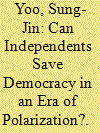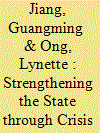| Srl | Item |
| 1 |
ID:
187449


|
|
|
|
|
| Summary/Abstract |
It is evident from the literature that political polarization has played a role in facilitating voter participation. While high participation in a representative democracy is beneficial, it becomes dangerous when this results from intense polarization. This is because polarization has a greater potential to undermine the principles of democratic pluralism. With data from the 21st Korean general assembly, I find that independent voters consider political issues to be important cues for participation even under extreme polarization. Short-term issues such as the government response to COVID-19 that have largely been the concern of independent voters, have had a significant effect on voter participation, and the evaluation of party nominations has also had an impact on turnout among independents. These findings show that Korean democracy has not been completely buried under the influence of polarization and that the political process of representative democracy in Korea is still operating normally thanks to the existence of independent voters.
|
|
|
|
|
|
|
|
|
|
|
|
|
|
|
|
| 2 |
ID:
187450


|
|
|
|
|
| Summary/Abstract |
This paper adopts a two-level model to explain Malaysia’s forward diplomacy toward the Northeast Asian states, the larger economies beyond its immediate neighborhood of Southeast Asia. We contend that while such structural conditions as power dynamics drive and constrain the smaller state’s agency toward the Northeast Asian nations, their effects are filtered by domestic politics, specifically the ruling elite’s pathways of legitimation. The findings highlight that while diplomacy is almost always motivated by the imperatives of immediate reality and identity, there is a different genre of driver, that of nurtured necessity. This paper illustrates how Malaysia’s outlook toward the Northeast Asian states—and its resulting active and anticipatory diplomacy—has been more “discovered” than determined and why such diplomacy has been driven more by the elite’s domestic political needs than the idiosyncrasies of its leaders.
|
|
|
|
|
|
|
|
|
|
|
|
|
|
|
|
| 3 |
ID:
187451


|
|
|
|
|
| Summary/Abstract |
The idea that a change of government can alter the foreign policy orientation of a state is nothing new in international relations. This paper presents a preliminary investigation into the causal linkages between domestic political regime changes and foreign policy restructuring in Malaysia and South Korea. It assumes that regime changes allow for a greater propensity for the recalibration of foreign policy interests. Since the effectiveness of any bilateral cooperation depends on successful formulation and implementation, this paper dissects the transition, convergence and challenges in bilateral cooperation between the two countries. Both Mahathir Mohamad and Moon Jae-in saw a necessity to diversify economic partners that had resulted from the policies of previous administrations. While the basic elements of their foreign policy remained the same, both Malaysia and South Korea reevaluated their policies with regard to the international issues affecting their domestic interests. While relations had once been transactional at best, the convergence of the Look East Policy (LEP) 2.0 and the New Southern Policy (NSP) advanced bilateral relations for 22 months until the collapse of Mahathir’s government in 2020.
|
|
|
|
|
|
|
|
|
|
|
|
|
|
|
|
| 4 |
ID:
187448


|
|
|
|
|
| Summary/Abstract |
How do state leaders use crisis management to strengthen state infrastructural power? What explains the strategic choices of a state’s selective institutionalization of crisis measures? Crises offer unique opportunities for state-building, yet the role of crisis management in consolidating state power is underexamined. This paper explores these important issues by examining how the Chinese government has deployed wartime-like measures in battling the spread of Severe Acute Respiratory Syndrome (SARS) and COVID-19. While authorities in China have adopted unconventional measures in managing the crises, they have selectively normalized ad hoc practices and institutionalized certain measures to strengthen state infrastructural power once they have ended or been temporarily contained. Drawing on the frameworks of rational choice and historical institutionalism, our analysis suggests that the central government normalizes or institutionalizes measures that help to consolidate its control of the bureaucracy and enhance regime legitimacy.
|
|
|
|
|
|
|
|
|
|
|
|
|
|
|
|